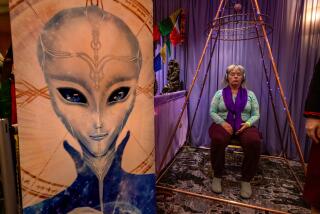New Age Seminar to Help Firms Deal With Change
- Share via
In a darkened studio in Burbank, Leland Russell, a rock concert light show producer turned real estate investor, watches 16 identical television monitors flash 16 talking heads. The heads belong to management consultants and executives excited about creativity, team building and the buzzword of the ‘90s, “empowerment.”
“We need to create a new way of learning,” said Russell, holding the script he wrote for “A Day in the Future,” a high-tech, New Age seminar debuting Thursday at the Beverly Hilton.
“This seminar provides a way to format your mind for the 1990s,” said Russell, who also co-wrote the music for two MTV-style videos he created for the daylong, $595-per-person production. Several corporate sponsors, including Motorola, Northern Telecom and General Electric, have donated equipment, cash or other support, and the event has drawn actor William Shatner of “Star Trek” fame as its local host and video narrator.
“The only permanent thing we are dealing with is change,” said Pete Thigpen, senior vice president for San Francisco-based Levi Strauss’ U.S. operations.
Thigpen, who appears in the videotaped portion of the presentation, said he is encouraging his managers to attend the Sept. 18 seminar in San Francisco. He is interested in the idea of “empowering” employees to make more decisions, he said, because he views his job as a manager as one of “enlarging lives.”
Freedom, change and the death of tyranny are recurrent themes throughout the multimedia presentation. The videos, for example, depict Chinese students marching in Tian An Men Square, the fall of the Berlin Wall and the bittersweet faces of Eastern Europeans celebrating new-found freedom.
Russell hits hard on the need for U.S. firms to acknowledge the world as a single market. He also stresses that in some cases, trade has a greater influence among nations than politics.
On the practical front, Russell advocates grooming and rewarding executives who think globally and urges U.S. companies to recruit managers from around the world. He also sees joint ventures, technology licensing agreements and franchises as ways to expand a company’s worldwide market share.
Between videotaped interviews with experts, computer graphics and live skits, participants take breaks to complete workbook exercises. The exercises make suggestions about how to share decision-making power and encourage more creativity within a company. The seminar also looks at computers and telecommunications equipment to help workers cope with the increased flow of information.
Shatner, a friend of Russell’s, said he agreed to participate because he wants to help America’s business leaders succeed in a changing business world. He said the seminar is designed to be “dramatic, with a purpose.”
It was inspired in part by a survey of 200 U.S. executives by Russell’s Irvine-based Marketing Institute. The survey, which included participants from 30 Orange County companies, found that few executives felt prepared to deal with the future.
In Orange County, almost 40% of the surveyed executives admitted that they did not have a clear understanding of where their company was headed, Russell said.
The results challenged Russell and partner Gordon Walker to seek corporate support to create the program.
Russell, who plans to take the show on the road around the country next year, said the corporate sponsors will be watching the public’s response to the program because they may adapt scaled-down versions for their internal training purposes.
More to Read
Inside the business of entertainment
The Wide Shot brings you news, analysis and insights on everything from streaming wars to production — and what it all means for the future.
You may occasionally receive promotional content from the Los Angeles Times.









